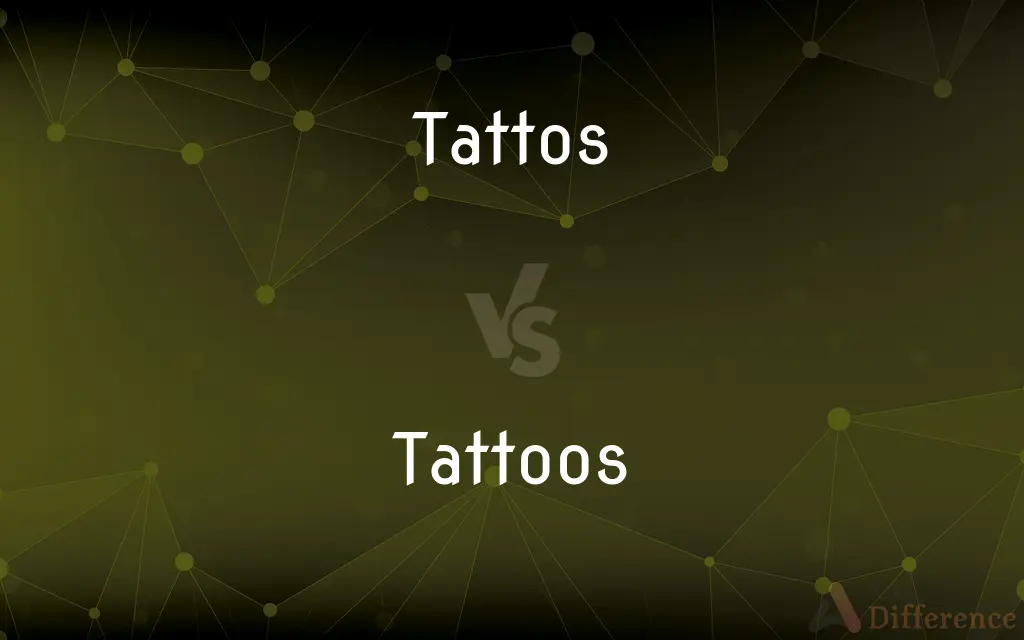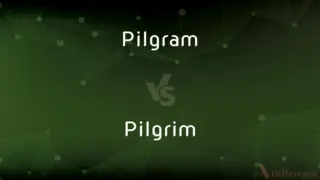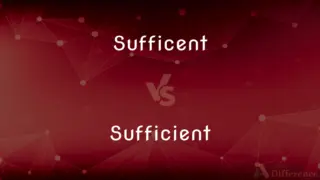Tattos vs. Tattoos — Which is Correct Spelling?
Edited by Tayyaba Rehman — By Fiza Rafique — Updated on March 31, 2024
"Tattos" is an incorrect spelling; the right one is "Tattoos," permanent designs inked onto the skin.

Table of Contents
Which is correct: Tattos or Tattoos
How to spell Tattoos?

Tattos
Incorrect Spelling

Tattoos
Correct Spelling
ADVERTISEMENT
Key Differences
Remember that "too" has double 'o' and so does "tattoos."
Think of "tattoo" like "zoo," both end with "oo."
Picture two tattoos on both arms, emphasizing the "oo."
Consider that "tattoo" has more letters than "tat" (short for tattoo).
Recall the phrase: "Two arms, two 'o's in tattoos."
ADVERTISEMENT
How Do You Spell Tattoos Correctly?
Incorrect: He showed off his new tattos to his friends.
Correct: He showed off his new tattoos to his friends.
Incorrect: She was interested in the meanings behind different cultural tattos.
Correct: She was interested in the meanings behind different cultural tattoos.
Tattoos Definitions
Tattoos are permanent designs or markings inked on the skin.
His tattoos symbolize his life journey.
Tattoos represent a form of body art created with ink.
Tattoos have been a part of human cultures for centuries.
Tattoos can signify memories, beliefs, or personal meanings.
Each of her tattoos tells a different story.
Tattoos can vary from small symbols to intricate artworks.
She got two small tattoos on her wrist.
A signal sounded on a drum or bugle to summon soldiers or sailors to their quarters at night.
A display of military exercises and music offered as evening entertainment.
A continuous, even drumming or rapping.
A permanent mark or design made on the skin by a process of pricking and ingraining an indelible pigment or by raising scars.
A design made on the skin with a temporary dye such as henna or ink.
To beat out an even rhythm, as with the fingers.
To beat or tap rhythmically on; rap or drum on.
To mark (the skin) with a tattoo.
To form (a tattoo) on the skin.
Plural of tattoo
Tattoos are created by inserting ink into the skin's dermis.
Proper care is essential after getting tattoos to avoid infection.
Tattoos Meaning in a Sentence
Tattoos can represent significant memories or people.
Getting tattoos removed can be more painful than getting them.
She dedicated her research to the history of tattoos in ancient civilizations.
Many celebrities flaunt their tattoos as part of their image.
Tattoos have been a form of expression for thousands of years.
Some workplaces have strict policies about visible tattoos.
He has tattoos that cover both of his arms.
UV tattoos are invisible under normal light and can be quite unique.
Watercolor tattoos have become increasingly popular.
Temporary tattoos are a great way for children to experiment with body art.
Vegan tattoos use inks free from animal by-products.
Tattoos were once considered taboo in many societies.
Tattoos in some cultures are rites of passage.
Tattoos can fade over time and require touch-ups.
He was known for his elaborate tattoos that told a story.
Matching tattoos are popular among couples and friends.
Some religions have specific beliefs and practices related to tattoos.
Custom tattoos are often more meaningful to the individuals who get them.
Tattoos can be a form of therapy, commemorating personal growth or recovery.
Tattoos Idioms & Phrases
A canvas of tattoos
Describing a body heavily adorned with tattoos.
His arms were a canvas of tattoos, each with its own origin.
Tattoos tell tales
The idea that tattoos narrate stories or experiences.
Every time someone asks about her tattoos, she says, Tattoos tell tales, and shares her story.
Common Curiosities
Which vowel is used before Tattoos?
"O" as in "some tattoos."
Why is it called Tattoos?
The term originates from the Tahitian word "tatu," meaning "to mark."
What is the verb form of Tattoos?
The verb form is "tattoo" (as in "to tattoo someone").
What is the pronunciation of Tattoos?
It's pronounced as /təˈtuːz/.
What is the singular form of Tattoos?
The singular form is "tattoo."
Which preposition is used with Tattoos?
Various prepositions like "of," "with," or "on" can be used, depending on the context.
Is Tattoos an adverb?
No.
What is the root word of Tattoos?
The root word is "tattoo."
Is Tattoos a noun or adjective?
It's a noun.
Is Tattoos an abstract noun?
No, it's a concrete noun.
Is Tattoos a vowel or consonant?
"Tattoos" is a word, not a letter.
Is the word Tattoos imperative?
No.
What is the plural form of Tattoos?
The plural form is "tattoos."
Which conjunction is used with Tattoos?
Any conjunction can follow, depending on the sentence.
Is Tattoos a negative or positive word?
Neutral. Its perception depends on cultural or individual viewpoints.
Is Tattoos a collective noun?
No.
Is the Tattoos term a metaphor?
No, but tattoos can be used metaphorically in literature.
Is the word “Tattoos” a Direct object or an Indirect object?
It can be a direct object, e.g., "She showed her tattoos."
What is another term for Tattoos?
Ink or body art.
What is the first form of Tattoos?
"Tattoo."
How do we divide Tattoos into syllables?
Tat-toos
What is a stressed syllable in Tattoos?
The second syllable, "toos."
How many syllables are in Tattoos?
Two syllables.
Which determiner is used with Tattoos?
Determiners such as "some," "many," "her," etc. can be used.
What is the third form of Tattoos?
"Tattooed."
Which article is used with Tattoos?
"The" or "a," depending on the context.
Is Tattoos a countable noun?
Yes.
Is the word Tattoos a Gerund?
No.
What part of speech is Tattoos?
Noun.
What is the opposite of Tattoos?
There isn't a direct opposite, but "bare skin" contrasts the concept.
What is the second form of Tattoos?
"Tattooed."
How is Tattoos used in a sentence?
"Many cultures have unique tattoos that hold significant meanings."
Share Your Discovery

Previous Comparison
Pilgram vs. Pilgrim
Next Comparison
Sufficent vs. SufficientAuthor Spotlight
Written by
Fiza RafiqueFiza Rafique is a skilled content writer at AskDifference.com, where she meticulously refines and enhances written pieces. Drawing from her vast editorial expertise, Fiza ensures clarity, accuracy, and precision in every article. Passionate about language, she continually seeks to elevate the quality of content for readers worldwide.
Edited by
Tayyaba RehmanTayyaba Rehman is a distinguished writer, currently serving as a primary contributor to askdifference.com. As a researcher in semantics and etymology, Tayyaba's passion for the complexity of languages and their distinctions has found a perfect home on the platform. Tayyaba delves into the intricacies of language, distinguishing between commonly confused words and phrases, thereby providing clarity for readers worldwide.


































